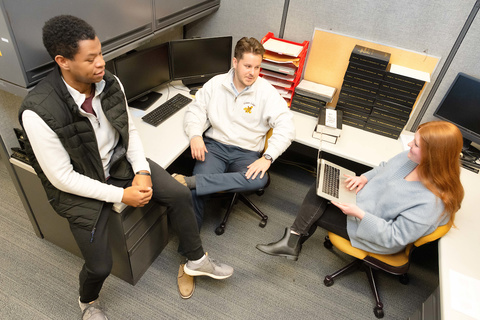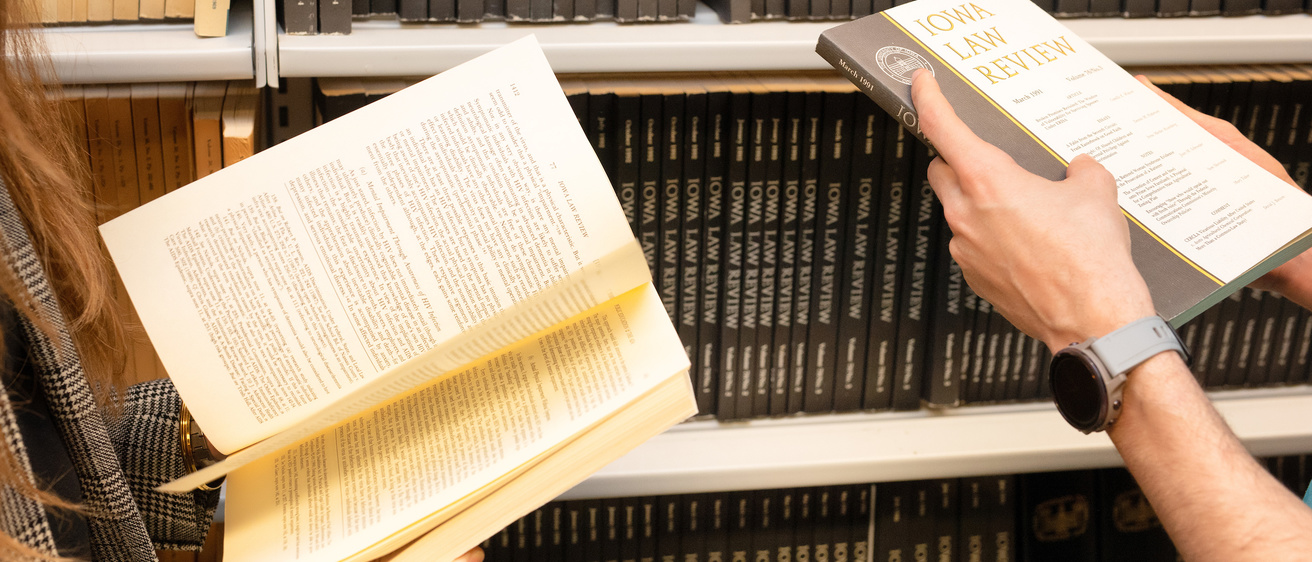The annual Write-On Competition evaluates students' writing, research, and analytical thinking skills. The process is open to first-year law students and occurs each spring following the last day of final exams.
Kate Conlow, the 2022-2023 editor-in-chief of the Iowa Law Review, explained the process based on her experience.
“The write-on process comes after your first-year finals, so it can feel particularly grueling. I remember I had a week off before starting my summer job, and there was a lot going on in addition to writing my Comment. Luckily, journals at Iowa Law give students significantly more time than other schools. We get two to three weeks, and other schools usually only get a weekend or a couple of days,” she says.
The Write-On Competition covers different topics, challenging first-year law students to demonstrate their writing skills and legal acumen. During Conlow's 1L spring, students were tasked with crafting a case Comment on the landmark Supreme Court decision, Agency for International Development v. Alliance for Open Society International, 140 S. Ct. 2082. At the heart of this case was a critical issue regarding the extraterritorial application of the Constitution, with a specific focus on the First Amendment.
"Before the assessment, I hadn’t taken a class on the first amendment or international and business law, so I found it very interesting. I spaced out reading, outlining, and writing my comment over two weeks,” says Conlow.
A bonus of participating in the Write-On Competition is that students can leverage their final Comment as a writing sample while searching for employment.
“I think it's safe to say that the write-on process challenges every student who participates,” says Luke P. Kennedy, the 2022-2023 editor-in-chief of the Journal of Corporation Law. “It's difficult, but understanding that everyone feels the same pressure and pushing yourself to put forth the best writing you can is worth it.”

After each candidate’s write-on assessment has been submitted and reviewed, the top-scoring students receive an offer to join one of the four student-edited law journals at Iowa Law—the Iowa Law Review, the Journal of Gender Race & Justice, the Journal of Corporation Law, and Transnational Law and Contemporary Problems.
According to Conlow and Kennedy, their experiences participating in law journals have been incredibly rewarding, impactful, and beneficial to their future career aspirations. Beyond the academic benefits, they believe the law journals fostered a strong sense of community and teamwork among their fellow students.
“When I became editor-in-chief, I knew who my fellow board members were, but I didn’t know them very well. Over the course of the year, they became my closest friends, and we successfully built a close-knit and wonderful community. When I look back at law school, I know Iowa Law Review will be the highlight, specifically the friendships and camaraderie that came with it,” says Conlow.
“My experiences with the Journal of Corporation Law have been nothing but positive. Working with a group of dedicated individuals like my fellow board members towards a common goal has been incredibly rewarding and challenging," adds Kennedy.
As a faculty advisor for the law school's journals, Professor Joseph Yockey underscores the significant impact that joining one of these esteemed publications can have on students' academic and professional growth.
"Joining one of the law school’s journals immediately places students at the core of cutting-edge policy debates and academic discourse,” he says. "It also helps students’ career prospects immensely by signaling to employers a passion for writing, research, and the law. Perhaps even more importantly, though, serving on a journal allows students to be part of something bigger than themselves and the law school. As journal members, students become permanently intertwined with our collective history, reputation, and legacy of scholarly excellence. Few other experiences in law school promise students a similar level of lasting, global impact,” adds Yockey.
Professor Lorie Reins-Schweer, who also serves as a faculty advisor for the law journals, similarly underscores the immense value these publications offer students.
“Normally, this is a law student's first opportunity to participate in running a business, complete with contractual obligations, a budget, employees, and the publication process. Students otherwise may not have an opportunity to participate in business management in this way, and it is an excellent opportunity,” she says.
Although working on a law journal can be challenging, student editors report that the experience provides a unique and valuable opportunity to develop essential skills and engage with groundbreaking scholarship.
“The chance to review and edit scholarship from some of the most renowned scholars in the field is a reward in and of itself, which underscores the invaluable experience that participating in a law journal can offer,” says Kennedy.
For more information, visit: Write-On Competition.
